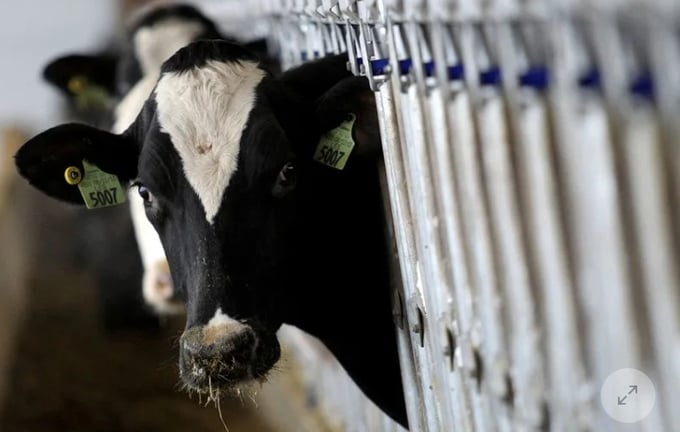June 21, 2025 | 02:27 GMT +7
June 21, 2025 | 02:27 GMT +7
Hotline: 0913.378.918
June 21, 2025 | 02:27 GMT +7
Hotline: 0913.378.918

A dairy cow stops to look up while feeding at a dairy farm in Ashland.
Federal officials are seeking to verify the safety of milk and meat after confirming the H5N1 virus in 34 dairy cattle herds in nine states since late March, and in one person in Texas.
Both the U.S. Centers for Disease Control and Prevention and the World Health Organization have said the overall public health risk is low, but is higher for those with exposure to infected animals.
Scientists believe outbreaks are more widespread in cows than officially reported based on findings of H5N1 particles in about 20% of milk samples. The U.S. Food and Drug Administration said on Friday that preliminary results of gold-standard PCR tests showed pasteurization killed the bird flu virus in milk, though.
The U.S. Department of Agriculture will analyze retail ground beef samples with PCR tests that indicate "whether any viral particles are present," and conduct two other safety studies, according to a statement. Some dairy cows are processed into ground beef when they grow old.
"USDA's additional testing is appropriate to ensure public health is protected and to stop the spread of animal disease," said Sarah Little, spokesperson for the Meat Institute, an industry group representing meat processors
USDA on Monday began requiring lactating dairy cows to test negative for bird flu before being moved across state lines as officials seek to contain the virus.
The department said this weekend that testing is not required for cows that are shipped over state lines directly to slaughter facilities from barns where they are sold. Those cattle only need documentation showing they were inspected by a veterinarian.
USDA said it inspects each animal before slaughter, and all cattle carcasses must pass inspection after slaughter to enter the human food supply.
USDA is now also collecting beef muscle samples at slaughter facilities of dairy cattle that have been condemned to determine the presence of viral particles, according to the statement. Any positive PCR tests for retail or slaughter samples will be evaluated for live virus, the USDA said.
Last week, USDA said it had found bird flu in a lung tissue sample from an asymptomatic dairy cow that was sent to slaughter from an infected herd. The animal did not enter the food supply, according to the department.
In another safety study, USDA will cook ground beef containing a "virus surrogate" at different temperatures to assess how it inactivates the virus, according to the statement. It said cooking meat to a safe internal temperature kills bacteria and viruses.
Colombia restricted the import of beef and beef products coming from U.S. states where dairy cows have tested positive for avian influenza as of April 15, according to the USDA.
There are no known cases of bird flu in beef cattle so far.
The human case in the current outbreak was in a Texas farm worker who suffered conjunctivitis following exposure to dairy cows.
(Reuters)

(VAN) Poultry production in Poland, which has only started recovering from devastating bird flu outbreaks earlier this year, has been hit by a series of outbreaks of Newcastle disease, with the veterinary situation deteriorating rapidly.

(VAN) Extensive licensing requirements raise concerns about intellectual property theft.

(VAN) As of Friday, a salmonella outbreak linked to a California egg producer had sickened at least 79 people. Of the infected people, 21 hospitalizations were reported, U.S. health officials said.

(VAN) With the war ongoing, many Ukrainian farmers and rural farming families face limited access to their land due to mines and lack the financial resources to purchase needed agricultural inputs.

(VAN) Vikas Rambal has quietly built a $5 billion business empire in manufacturing, property and solar, and catapulted onto the Rich List.

(VAN) Available cropland now at less than five percent, according to latest geospatial assessment from FAO and UNOSAT.

(VAN) Alt Carbon has raised $12 million in a seed round as it plans to scale its carbon dioxide removal work in the South Asian nation.